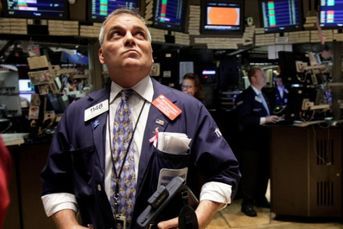INDUSTRY LAYOFFS LIKELY A `90S HIGH: DESPITE THE BOOM, MANY OUT ON STREET
Stewart Ragar's future seemed boundless when he landed a job back in 1994 as Daiwa Securities' Latin American equity analyst.
Emerging economies were posting great returns. Brokerages and banks were racing to fatten their coverage. “Everything was going great,” says Mr. Ragar, now 36, from his Manhattan home. “We were expanding.”
Then last July, his career hit the wall. Daiwa agreed to merge with Sumitomo Bank. Soon, “cost-cutting measures” were announced. Everyone on the Latin America desk, save the economist, received a pink slip. In November, Mr. Ragar emptied his desk.
Welcome to the new financial world order. More customers are pouring more money than ever into investments. Standard and Poor’s 500 stock index finished last month with its fourth straight 20%-plus annual return. Yet beneath the prosperous surface lurks a sense that all is not well. From customer service reps to investment bankers, employees feel vulnerable.
Perhaps that’s because financial services companies announced 62,366 layoffs last year, representing 11% of all layoffs in the country, according to public figures compiled by Chicago outplacement firm Challenger Gray & Christmas.
Last year’s downsizing carnage was even worse than the mid-decade bond market debacle that led to 55,000 financial services layoffs in 1995. It may be the highest total of the decade, but Challenger’s records only go back as far as 1993, and the U.S. Labor Department does not track layoffs by sector.
“It’s a scary environment,” says Larry Chimerine, a managing director at the Economic Strategy Institute in Washington. “In this new world we live in, the industry responds much quicker than it used to. If there’s some kind of accident and a company misses its earnings, it has to adjust quickly or its stock gets killed. This leaves the average worker very vulnerable.”
‘Everyone is worried’
How vulnerable? Consider that BankAmerica Corp., which recently merged with NationsBank Corp., announced last week it would cut 18,000 jobs – 10% of its work force – over the next three to four years.
Mutual fund company Franklin Resources Inc. last week said it would chop 7% of its work force, a 560-job cut that’s the biggest in its 52-year history.
Potential market shocks from Brazil’s currency devaluation last week could batter companies from New York to Shanghai in the coming months. And don’t forget the costly millennium bug problem.
“Everyone is worried for the time being,” says a worker at the New York office of Interacciones Global Inc., a Buenos Aires-based brokerage that has seen layoffs in recent weeks. “Things look bleak one day and better the next. Nobody knows what’s going to happen.”
What drove many of the layoffs last year were the sizable hits banks and brokerages took in their foreign markets and fixed-income divisions.
The Asian crisis, combined with Russia’s default in August, sent investors fleeing emerging markets everywhere. Wall Street responded by tightening its trading risk profiles, which means even less trading and therefore more layoffs.
Those hit the hardest were higher-risk operations – emerging markets, bond trading and sales, derivatives – as well as some on the investment banking side, due to a slowdown in corporate mergers and initial public offerings. Big bank mergers – NationsBank and BankAmerica, as well as Citicorp and Travelers Group Inc., Wells Fargo & Co. and Norwest Corp., First Chicago NBD Corp. and Banc One Corp. – also took their usual toll.
Merrill Lynch & Co. Inc. was the first to react by firing 3,400 people, or 5% of its worldwide work force. Citigroup followed in December by announcing it would cut costs by slashing 10,400 jobs, or 6%.
ING Barings began eliminating 1,200 of its 9,000 jobs. Prudential Securities Inc. cut 400 positions. The new Wells Fargo & Co. said up to 830 employees could be laid off as a result of the merger, while New York brokerage D.E. Shaw announced it was firing more than 250 workers and closing a California office.
Stock analysts are lauding the layoffs, saying corporate America has learned its lessons from the excesses of the 1980s.
“The securities industry has a tendency to get ahead of itself in terms of employment,” says Michael Flanagan, analyst and owner of Financial Services Analytics in Philadelphia. “Given a downtick, the industry reacts quickly. But the moves are more of a fine-tuning than a retrenchment. The cuts have been appropriate.”
As for those appropriately cut: It’s unclear where many of them will find work. The market for emerging markets professionals and fixed-income traders has become extremely tight, and industry watchers predict a slow turnaround.
Peter Marber, president of Wasserstein Perella Emerging Markets Ltd., who oversees two hedge funds, says emerging markets professionals must be “amoeba-like and adapt to regions of the world that are doing well economically.”
Indeed, the jobless Mr. Ragar hopes to remain in equity analysis. But others, who ask to remain anonymous, say they plan to return to school, hoping an advanced degree will improve their odds on Wall Street. Still others want to leave the industry altogether for a job with more long-term security.
Says another analyst who was cut during Daiwa’s downsizing: “I don’t think people realize that for most of us this is it – we’re leaving the industry for good.”
Many smaller firms are using the recent wave of layoffs as opportunities to snag talent they may have been unable to attract previously.
“We’re looking on a selective basis at people in corporate finance, research and operations,” says James Brinkley, president of regional brokerage Legg Mason Wood Walker Inc. in Baltimore.
Yet most regional brokerage or financial planning outfits don’t have much need for such exotic specialties as emerging markets, derivatives and currency trading.
“Even if some of the talent was transferable, regionals are not committing to expansion into new areas,” says Mr. Flanagan. “They’re loath to take on a new employee in a new area.”
Go elsewhere, young man
Some outplacement specialists suggest job seekers look outside the industry.
“The challenge for those laid off is to examine their skills and find out what’s out there,” says Mark Landsberg, a managing consultant for Drake Beam Morin, a Boston-based outplacement service.
“If jobs on foreign desks or research don’t exist, what else can you do to transfer those skills to other areas?”
Outplacement consultant Terry Ebert of New York’s Ayers Group says his firm has been approached by nearly 50 firms, many of them technology companies, for referrals of financial services workers.
A major problem for many of those out of work, however, is pay. A bond trader who was making more than $500,000 a year may have to accept a $150,000 job managing currency transactions for an international company, according to John Challenger, chief executive of the Chicago-based outplacement firm that bears his name. “You need to change your financial expectations.”
And keep those expectations low. The continuing mergers in the financial services industry will lead to layoffs in 1999. Just ask the one in 10 BankAmerica employees whose jobs are to be eliminated.
Or watch Deutsche Bank AG, which wants to acquire Bankers Trust New York Corp. The German giant announced last month that if the merger goes through it may cut up to 5,500 overlapping jobs, mostly in New York and London, in back-office and commercial bank-related operations.
Or talk to Mr. Ragar. Until last week, he had been hoping things in Latin America might turn around, forcing banks and brokerages to refill their foreign desks.
News of Brazil’s surprise currency devaluation struck him hard as he watched markets worldwide fall amid predictions by economists that the region would be stuck in recession for much of 1999.
“It’s a little tough right now,” confesses Mr. Ragar, “but I’m staying optimistic.”
Learn more about reprints and licensing for this article.






